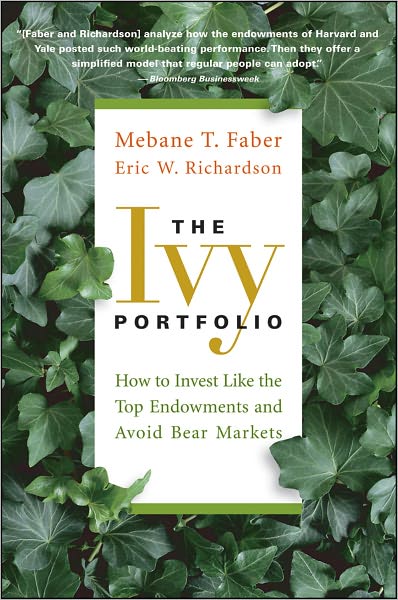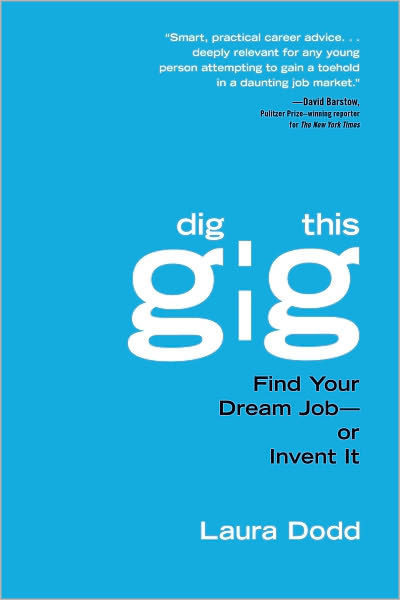Book Review: The Ivy Portfolio
This is an unusual book, and a good book.? Unlike the book, “Outperform,” which reviews lesser known endowments, and endowment investing generally, this book reviews the Harvard and Yale endowments, which up until 2008, the year before the book was published, were among the best in terms of performance.
But this book is more than that.? It goes through the strategies of the major endowments, and looks for ways that average people can try to replicate the results.
But average investors don’t have the same set of investments available to them as the large endowments do.? If you aren’t a qualified investor who has access to the full range of investments ordinary mortals are denied — private limited partnerships (hedge? funds, private equity, commodity funds, etc), what can you do?? This book discloses investments that are similar if not equivalent, and versions that are lower cost through ETFs.
After that, the book takes a direction that would initially seem different than endowment investing.? It discusses trend following, which endowments do not in general use as a strategy.? Now, some hedge funds use it, but few endowments actively embrace it.? The book shows how return can be enhanced and volatility reduced by buying investments that are over their 200-day, or 10-month moving averages.? From my own research I can partially validate the approach.? It is a clever way of implementing a form of momentum investing, which may be a cheap way for average investors to mimic hedge funds who follow trends.
Then mimicry moves to a new level as the book goes through the basics of mining data out of 13F filings, where large investors file their long investments with the SEC.? Guess what?? Imitating bright people can help an investor beat the market — it can allow a bright person to mimic the long side of equity investing on the cheap, but with a lot of data analysis (or you can pay up for Alphaclone).
In one sense, the book seems like two books — one on endowment investing, and another on tools for clever investing available to average investors.? My way of reconciling the two is that the authors are clever guys who are trying to give their best ideas to retail investors so that they can do as well as sophisticated institutional investors who have a wider array of investments to choose from.? The retail investors don’t have the same array of investments to choose from, but they have the advantage of flexibility that institutions don’t and can more quickly trade out of investments that may be on the way to underperformance via trend-following.
And so with much effort, if you apply their ideas, you have the potential of doing as well in investing as the major endowments.? Or, absorb one of their passive strategies with little effort, and maybe you will do as well.? Strategies that have done well in the past may not do so in the future.
But on the whole, I heartily recommend this book.? There is a lot for investors of all types to learn from it.
Quibbles
Those reading the book should also read my essay, “Alternative Investments, Illiquidity, and Endowment Management. (Google it if there is no link)”? Taking on illiquidity is not a free lunch.? It can impose real costs when there is a need for cash among those endowed.? Personally, I think that ten years from now, illiquid investments will only be taken on by those that can lock them away.
Who would benefit from this book:
Those wanting to potentially mimic the high returns of the Harvard and Yale endowments could benefit from the book, but realize that a lot of the past is an accident, and that it might be difficult to achieve high returns in the future from strategies that worked in the past.? That said, the authors have offered strategies that take some degree of work to apply, so there may be barriers to entry for applying some of the strategies.
If you want to, you can buy it here: The Ivy Portfolio: How to Invest Like the Top Endowments and Avoid Bear Markets.
Full disclosure: I asked the publisher for this book, and they sent it to me.? I read and review ~80% of the books sent to me, but I never promise a review, or a? favorable review.
If you enter Amazon through my site, and you buy anything, I get a small commission.? This is my main source of blog revenue.? I prefer this to a ?tip jar? because I want you to get something you want, rather than merely giving me a tip.? Book reviews take time, particularly with the reading, which most book reviewers don?t do in full, and I typically do. (When I don?t, I mention that I scanned the book.? Also, I never use the data that the PR flacks send out.)
Most people buying at Amazon do not enter via a referring website.? Thus Amazon builds an extra 1-3% into the prices to all buyers to compensate for the commissions given to the minority that come through referring sites.? Whether you buy at Amazon directly or enter via my site, your prices don?t change.




